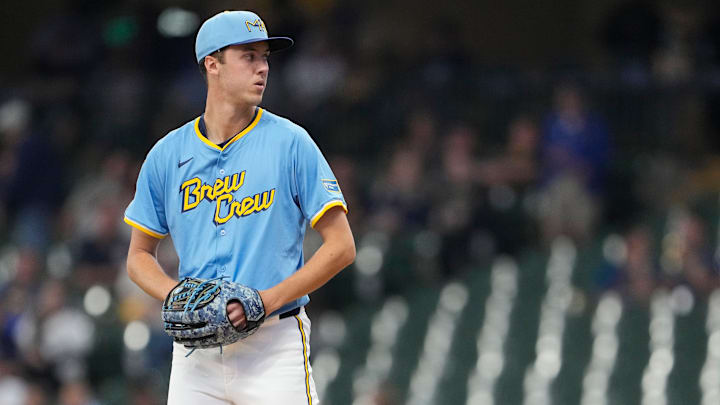Jacob Misiorowski’s long-awaited call-up to the Milwaukee Brewers has been a hot topic all season — and not just because of the 6-foot-7 flamethrower's triple-digit fastball. As the Brewers battled rotation injuries and leaned heavily on an overtaxed pitching staff, many were left asking the obvious: Why hasn’t Misiorowski been called up yet?
Despite what the front office says, the answer may not lie in pitch counts or readiness, but in the murky world of MLB service time.
In an episode of Nothing Personal with David Samson, the CBS Sports analyst pointed to a glaring example involving another top prospect — the Kansas City Royals' Jac Caglianone — to highlight a key misstep. By promoting Caglianone too early, Samson explained, the Royals likely guaranteed that their young slugger would now qualify for Super Two status, potentially costing the team a full year of affordable control.
As explained on MLB.com, "To qualify for the Super Two designation, players must rank in the top 22 percent, in terms of service time, among those who have amassed between two and three years in the Majors. The specific cutoff date varies on a year-to-year basis." Therefore, the longer teams wait, the less likely it is that their player will qualify for Super Two status, which allows the player to become arbitration-eligible before they reach three seasons of service time.
“If you don’t call up a player until towards the end of June, the whole first season is on the house,” Samson said. “Because there’s still three full seasons before arbitration.”
That single line may provide all the insight Brewers fans need.
Brewers' Jacob Misiorowski call-up timing hints at service time play
While MLB has attempted to curb blatant service time manipulation through the latest Collective Bargaining Agreement — including bonus incentives for early prospect promotions — the loophole remains. And for small-market teams like Milwaukee, the financial implications are very real.
Delaying Misiorowski’s debut until mid-to-late June means the Brewers will retain three full seasons of club control at the league-minimum salary before arbitration kicks in. It’s not just gamesmanship — it’s long-term payroll strategy.
The Brewers now get a chance to let Misiorowski acclimate at the big-league level without burning a year of team control. He can learn, adjust, and develop against MLB hitters — all while the organization protects its future budget and flexibility.
From the player’s standpoint, it may not be ideal. A delayed debut means delayed earning power. But for the Brewers, it’s a calculated decision, one made with the long view in mind. Whether the endgame is a contract extension or arbitration battles, one extra year of affordable control can make all the difference in how a small-market team builds around a top-tier arm.
For Misiorowski, his time has finally come. But for the Brewers, the clock has only just started — and exactly when they wanted it to.
